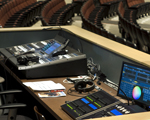I run sound at a local church about once a month. I used to spend time behind a mixing board several times a week, but these days it tends to be more time in front of a computer. Several recent discussions with the Music Director at the church got me pondering this question: What really makes a “good” mix? And the inevitable follow-up question is: How hard is it to train a church tech team volunteer so that they can get a “good” mix as the church sound board operator? Here’s my opinion…
Many people think that after a couple of hours being shown how to operate a sound board, a church tech team volunteer should be able to get things going. If your goal is to just turn things on and off, then this may be accurate (depending on the complexity of the system). But being able to turn things on and off or up and down is a long way from mixing “good” sound, let alone “great” sound. A weekend training session or even a week-long class is very helpful, but not enough. A “Good” mix is not made up of just the right mic placement, or just the right EQ, or just the right reverb, or just the right gain structure, or just the right equipment, instruments, or amplifiers. All of these things are important and necessary (or at least really helpful). But what really makes a mix come together is listening.
You see, working a sound board is kind of like playing an instrument…or maybe sort of like conducting an orchestra. Neither of those is a perfect analogy, but they capture some of the complexities of knowing the feel of the instrument so intimately that you can bring forth exactly the tone and timber that you want. Or anticipating how one part of a group of musicians will sound and then reacting in real time to adjust levels and sounds so that the end product has just the right blend and impact.
A good sound person knows the basics of how to get the sound, but takes it further and is constantly listening to the mix while simultaneously thinking at least a ½ verse ahead of where the song currently is. A good sound person knows the music at least as well as the band and understands the flow of dynamics that the music set will have. All of this knowledge, effort, and preparation is for one thing and one moment. Right now, at this exact point in the song, should that particular instrument be just a little bit louder or maybe a just little bit softer? Or should it be right where it is?
How do you know? The answer: Practice. For the same reason that you cannot learn the piano or guitar in a couple of hours, you cannot expect someone to mix well with very little practice. How long does it take to become a good musician? Years… many, many hours. Talk to almost anyone you know who can mix a band well and they will invariably have many years of experience doing it. You want good sound people? Set them up with a multi-track recording system and record the band every week. Put together a little mix-down studio in a back room and let the sound team come in and mix and re-mix and re-mix again until they get a great mix. Record it and then play it back for the worship leader. Talk about the mix. Then do it all again. Practice listening and then you start to develop a “feel” for what needs to be a little more or a little less. Or maybe it’s just right where it is.
Once you really start listening and practicing your craft, “great” sound starts to come within reach. At Acoustics By Design, our passion is helping people become great at using technology. We use our expertise and experience to help church tech teams achieve a truly “great” mix.
